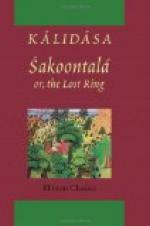Although, in the conduct of the plot, and the delineation of character, Hindu dramatists show considerable skill, yet they do not appear to have been remarkable for much fertility of invention. Love, according to Hindu notions, is the subject of most of their dramas.
The hero, who is generally a king, and already the husband of a wife or wives (for a wife or two more or less is no encumbrance in Indian plays), is suddenly smitten with the charms of a lovely woman, sometimes a nymph, or, as in the case of [S’]akoontala, the daughter of a nymph by a mortal father. The heroine is required to be equally impressible, and the first tender glance from the hero’s eye reaches her heart. With true feminine delicacy, however, she locks the secret of her passion in her own breast, and by her coyness and reserve keeps her lover for a long period in the agonies of suspense. The hero, being reduced to a proper state of desperation, is harassed by other difficulties. Either the celestial nature of the nymph is in the way of their union, or he doubts the legality of the match, or he his own unworthiness, or he is hampered by the angry jealousy of a previous wife. In short, doubts, obstacles, and delays make great havoc of both hero and heroine. They give way to melancholy, indulge in amorous rhapsodies, and become very emaciated. So far, it must be confessed, the story is decidedly dull, and its pathos, notwithstanding the occasional grandeur and beauty of the imagery, often verges on the ridiculous.
But, by way of relief, an element of life is generally introduced in the character of the Vidushaka, or Jester, who is the constant companion of the hero; and in the young maidens, who are the confidential friends of the heroine, and soon become possessed of her secret. By a curious regulation, the Jester is always a Brahman, and therefore of a caste superior to the king himself; yet his business is to excite mirth by being ridiculous in person, age, and attire. He is sometimes represented as grey-haired, hump-backed, lame, and ugly. In fact, he is a species of buffoon, who is allowed full liberty of speech, being himself a universal butt. His attempts at wit, which are rarely very successful, and his allusions to the pleasures of the table, of which he is a confessed votary, are absurdly contrasted with the sententious solemnity of the despairing hero, crossed in the prosecution of his love-suit. His clumsy interference in the intrigues of his friend only serves to augment his difficulties, and occasions many an awkward dilemma. On the other hand, the shrewdness of the heroine’s confidantes never seems to fail them under the most trying circumstances; while their sly jokes and innuendos, their love of fun, their girlish sympathy with the progress of the love affair, their warm affection for their friend, heighten the interest of the plot, and contribute not a little to vary its monotony.




